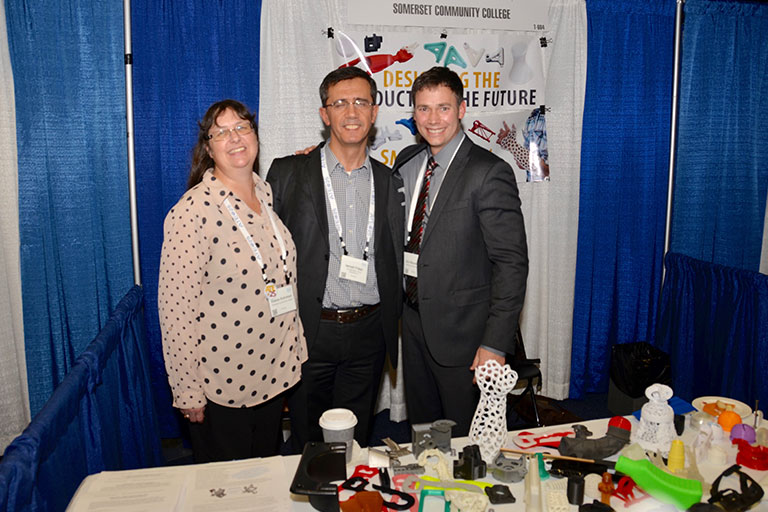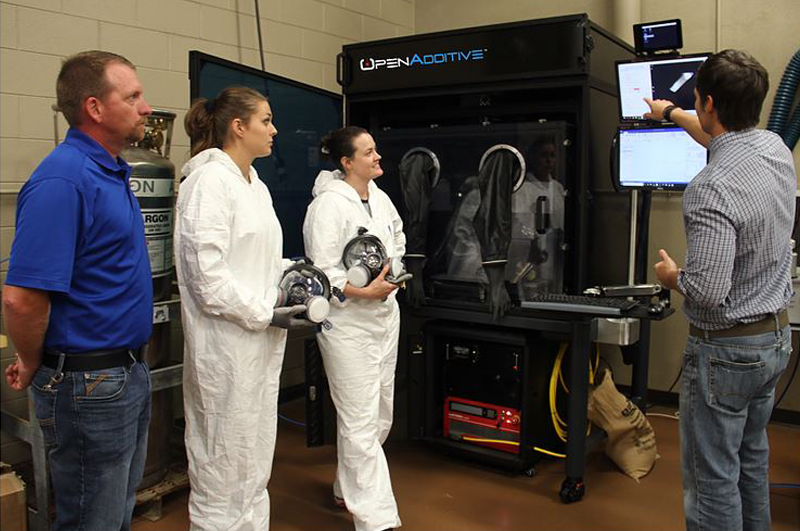Somerset Community College‘s (SCC) Additive Manufacturing Center of Excellence (AMCOE) in Kentucky has received a second National Science Foundation Advanced Technological Education (NSF ATE) grant award for its Mobile Additive Manufacturing Platform (Mobile AMP).
The NSF ATE focuses on the education of technicians in high-technology fields. Its grant will be used to help the Mobile AMP project provide in-depth training for teachers in advanced design for 3D printing, in partnership with the Tennessee Technological University (TTU). “At the end of the three years of the NSF funded Mobile AMP project, we expect a complete 180 degree turnaround in how 3D printing is taught and utilized across Kentucky and Tennessee,” explains Professor Eric Wooldridge, a professional engineer and director of the AMCOE. “And it will be a signal to all the manufacturing companies out there that this is the place to bring their advanced manufacturing work.”
“We have the technology and the people with the fundamental skills to make next-generation products that companies and consumers want, as well as homegrown startup innovations.”

The SCC Mobile Additive Manufacturing Platform
SCC’s Mobile AMP project aims to enhance the innovation and entrepreneurship infrastructure and aid the future workforces of both Tennessee and Kentucky. In order to do so, the institutions plan to train teachers, companies and students how to use high-end 3D printers and advanced design software.
Working with TTU, SCC will construct a trailer containing a mobile education system attached to a vehicle. This will enable the transportation of advanced additive manufacturing equipment to off-campus sites, where they can then be set up for teaching.
Through the Mobile AMP platform educators are able to get the equipment safely to schools and locations in potentially shorter times, while minimizing the risk of damage. Included in the mobile equipment will be 3D printing powder, resin, and metal sintering-based 3D printing systems. With this technology, SCC will provide hands-on training for students, teachers, and manufacturing professionals with advanced equipment and materials.
Using the NSF’s grant, SCC and TTU plan to provide further training with advanced design technologies, like generative design. Partnering with 3D software developer Autodesk, participants will therefore be trained in using the company’s entry-level 3D modeling software Fusion 360. Students and teachers will also be trained in other additive manufacturing applications that could prove key to manufacturing future products.

Teaching educators in 3D printing
The Mobile AMP program is one of many programs internationally seeking to provide school-age children and teachers with knowledge of a developing 3D printing industry. In the UK, PrintLab has created the PrintLab Classroom, providing lessons, teacher resources and online courses on 3D printing, as well as an online certified training course for educators.
The National STEM Learning Centre based at the University of York, UK, also partnered with learnbylayers, a provider of 3D printing educational resources, to run 3D printing courses for primary and secondary school teachers. Preparing them to use and teach technology in the classroom, they provided teachers with all the basics of the technology.
Taiwanese 3D printer manufacturer XYZprinting offers a K-12 STEAM curriculum that provides teachers with step-by-step instructions on how to use a 3D printer, and deliver engaging lessons with the technology. Educators also gain access to free software resources, and can upload their own 3D printing projects on XYZprinting’s Free Projects page.
Subscribe to the 3D Printing Industry newsletter for the latest news in additive manufacturing. You can also stay connected by following us on Twitter and liking us on Facebook.
Looking for a career in additive manufacturing? Visit 3D Printing Jobs for a selection of roles in the industry.
Featured image shows Eric Wooldridge explaining to students and Curtis Cash, SCC professor of Machine Tool Technology, how the OpenAdditive PANDA System operates. Photo via SSC.


